
Primary goal of attending an international conference is to present a paper to the experts and influencers. It gives you a platform to exchange your interest-related thoughts, paving the way for possible future collaborations.

Use this platform to build connections with an elite group of wise men and women to enhance your intellect. Young entrepreneurs, this is a great platform to connect with your peers.

Knowledge is Power. Knowledge teaches skills. Skills define excellence. Use this platform to become cognizant of your interest area to achieve excellence in your domain.

Attending a conference give you opportunity to get your abstract or paper published in conference proceedings

Meet and greet a myriad of industry professionals and academia experts with common interest. Every meal will be an opportunity to meet and interact with fellow researchers, attendees and experts.

Expand your professional competency and learn useful tips and tricks of your industry in our skill-building workshops.

Explore insights on recent advancements, new equipment, new techniques, and unpublished data, learn from thought-leaders and get to network with a great line up of speakers.

Our exhibits floor offers the attendees with a dynamic display of the latest products with cutting-edge technology.

Investing in you is the best investment. Peers Alley conferences give the patrons with a feeling of the serendipity of real learning, skill development in strategic workshops, networking and start-up opportunities, thus, is value for money.

Attending the conference gives you much needed break from your regular duties. It also allows you to explore new cities, culture and meet new people. You will feel energized and rejuvenated to return to the university and continue with the job after attending the conference.
Conferences are vital forum for academic researchers and business leaders. "It involves multiple presentations, interactive breakout sessions, hands-on product demonstrations and unrivalled networking opportunities".
We have invited some of the world's most sought-after keynote speakers, experts, brand ambassadors, and industry leaders to share their thoughts and ideas with our conference guests.
Register Now
WEBINAR on 4th World Forum on Infectious Diseases & Antimicrobial Resistance (IDAMR 2026) bringing together global experts to address one of the most pressing challenges in modern medicine. This premier gathering aims to explore groundbreaking research, innovative diagnostics, novel therapeutics, and public health strategies that are shaping the future of infectious disease management and the fight against antimicrobial resistance.
With its interdisciplinary sessions, IDAMR 2026 offers an outstanding platform for participants to engage in meaningful discussions, share cutting-edge advancements, and foster collaborations that extend beyond their field of expertise—ultimately enhancing knowledge, improving practice, and supporting professional growth.
This activity is designed for physicians, clinicians, internists, infectious disease specialists, microbiologists, virologists, bacteriologists, epidemiologists, immunologists, pharmacologists, nurses, nurse practitioners, physician assistants, hospitalists, public health professionals, pharmaceutical researchers, industry leaders, policy makers, academicians, scholars, residents, and students, along with delegate participation from organizations including universities, research institutes, pharmaceutical and biotechnology companies, and healthcare associations.
about IDAMR 2026 conference
Dear Colleagues,
We take great pleasure in inviting you to join us for the 4th World Forum on Infectious Diseases & Antimicrobial Resistance (IDAMR 2026), which will be held in London, UK, on June 25–26, 2026.
As one of the leading global congresses in the field, IDAMR 2026 is dedicated to advancing the practice, research, education, and innovation in the prevention, diagnosis, and treatment of infectious diseases, while addressing the growing threat of antimicrobial resistance. Our participants include infectious disease specialists, microbiologists, clinicians, epidemiologists, virologists, bacteriologists, parasitologists, immunologists, pharmacists, nurses, public health experts, policymakers, industry leaders, and researchers who share a common mission of tackling the challenges posed by emerging infections and resistant pathogens.
This exciting event provides an outstanding platform to bring together the best minds from academia, industry, and healthcare to share groundbreaking findings, exchange knowledge, and foster collaborations that will shape the future of global health. Through interactive sessions, keynote presentations, panel discussions, and networking opportunities, delegates will gain valuable insights into the latest scientific and clinical advancements.
We look forward to your active participation in IDAMR 2026 this September in London. Please mark your calendars and join us in advancing the dialogue and solutions for infectious diseases and antimicrobial resistance.
Sincerely,
Organizing Committee
IDAMR 2026
World Forum on Infectious Diseases
1126 59 Ave East, V5X 1Y9, Vancouver BC, Canada

The Lundquist Institute for Biomedical Innovation at Harbor-UCLA Medical Center, USA

Helmholtz Centre for Infection Research, Germany

Loyola University Stritch School of Medicine, Loyola University Medical Center, USA

Universidad Nacional de Cuyo, Argentina

Basic definition of infection refers to the harm caused by a foreign particle entering the host body. Some are mild and few are life-threatening depending on the type of organism causing it. Starting from the cause, symptoms, detecting the organism, clinical studies, treatment, controlling it before spreading, preventing the infection, developing new methods and techniques for diagnosis to developing new drugs and treatment strategies, you can discuss at our Euro Infectious Diseases 2020
The global market for infectious disease treatments is a result of the growth in demand for new pharmaceutical treatments, vaccines development, and environmental products. In 2017, the global market for the treatment of infectious disease totaled $64.8 billion. The market should total $99 billion by 2022, growing at a CAGR of 8.9% from 2017 to 2022.
Sub-Tracks
Market Analysis: The infectious diseases and global health market is a dynamic and expanding sector, primarily driven by the rising prevalence of infectious diseases, increasing antimicrobial resistance, and significant technological advancements. The market is broadly segmented into therapeutics (drugs and vaccines) and diagnostics. The therapeutics market, valued at around $124 billion to $243 billion, is dominated by viral infections and is projected to grow steadily, with North America holding the largest share due to its robust healthcare infrastructure and high R&D investment. Simultaneously, the infectious disease diagnostics market, valued at approximately $25 billion, is also seeing robust growth driven by the demand for rapid and accurate testing, particularly at the point of care.
The overall market is shaped by global health priorities, including pandemic preparedness, and is increasingly leveraging digital health technologies like telemedicine and AI to improve disease surveillance, diagnosis, and patient care, with the global digital health market alone projected to reach over $1.5 trillion by 2032. For more details: https://microbiology-infectiousdiseases.peersalleyconferences.com/tracks/infectious-diseases-and-global-health
Tags
Infectious Diseases Conferences Europe
Paediatric Infectious Diseases Conferences
Infectious Diseases Conferences
Healthcare Conferences
Epidemiology Conferences 2022
HIV/AIDS conferences
Tropical Medicine Conferences Australia
Influenza Conferences
Clinical Microbiology Conferences
Infection Conferences 2022 USA
Pathology Conferences
Infection Prevention & Control Conferences Asia
Hepatitis Conferences
Emerging Infectious Diseases Conferences
Infectious Diseases Conferences
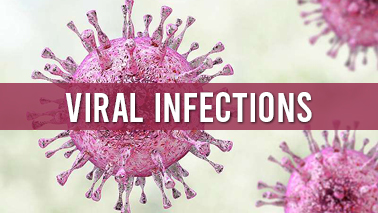
These viral infections usually last for 7-10 days on which even medications won’t be much effective for the treatment. Resting and intake of fluids mostly work. But few cases like HIV, Ebola and Hepatitis are chronic and need to be treated with medications. Different viruses attack liver, respiratory system, or blood even. Immune system plays a critical role here and vaccination comes helpful in some cases.
Global virology market is estimated to witness significant growth over the forecast period. The global viral infections market will grow from $74 billion in 2014 to $117.6 billion by 2021, representing a CAGR of 6.8%
Sub-Tracks
Market Analysis: The global market for viral infection treatments is currently a high-value sector, estimated to be worth between $67 billion and $80 billion in 2025, with some broader infectious disease market analyses placing its value even higher. This market is forecasted to grow at a Compound Annual Growth Rate (CAGR) ranging from 5.3% to 7.0% through 2032, with projections that could push its value to nearly $135 billion by the end of that period. The market is led by therapeutics for major viral pathogens; for example, the HIV segment is projected to hold a substantial market share of 38%, while antivirals for influenza are also a significant component. North America continues to dominate the geographical market with a 39.7% share in 2025 due to its robust healthcare infrastructure and high treatment rates, while the Asia-Pacific region is the fastest-growing market, with a projected CAGR of 6.7%. This growth is underpinned by continuous advancements in drug development, a strong focus on combination therapies, and ongoing public health initiatives to combat viral outbreaks.
For More Details: https://microbiology-infectiousdiseases.peersalleyconferences.com/tracks/viral-infections
Tags
Parasitology Conferences
Infection Conferences 2022
Emerging Infectious Diseases Conferences
Infectious Diseases Conferences
Immunologists Conferences 2022
Vaccines conferences
Clinical Microbiology Conferences
Infectious Diseases Conferences
Virology Conferences
Infectious Diseases Conferences Europe
Paediatric Infectious Diseases Conferences
HIV/AIDS conferences
Healthcare Conferences
Infection Prevention Conferences 2022
Pathology Conferences

Unlike Viral infections, bacterial infections can be treated with medications, antibiotics. Many species are even beneficial to our body but few cause infections which can be effectively treated using antibiotics. Immunization prevent the onset of many bacterial infections. This session discusses the complete details of these infection and also the research being carried out to fight the bacteria which are becoming antibiotic resistant
The global antibacterial drugs market was valued at $46.37Bn in 2018 and is estimated to increase at a CAGR of 1.5% from 2019 to 2027. North America stands first in the global antibacterial drugs market (2018). Global bacterial vaginosis drugs market research analysts estimate that it will generate revenue of almost USD 1 billion by 2021.
Sub-Tracks
Market Analysis: The global request for bacterial infection treatments is poised for significant growth, with its value estimated at roughly$ 55.60 billion in 2025. This sector is projected to expand to$ 67.88 billion by 2030, flaunting a harmonious emulsion periodic growth rate( CAGR) of 4.07 from 2025. Geographically, while North America holds a dominant request share of 35.9, the Asia- Pacific region is the swift- growing request, driven by adding healthcare spending. The request is also defined by its remedial parts, with Cephalosporins holding a prominent share of 26.5 and broad- diapason antibiotics dominating the overall request at 54.2 in 2025. This expansion is unnaturally fueled by the rising global frequence of bacterial infections and the critical need for new curatives to combat medicine resistance, with major players and new medicine blessings continually shaping the competitive geography.
For More Details: https://microbiology-infectiousdiseases.peersalleyconferences.com/tracks/bacterial-infections
Tags
Infectious Diseases Conferences Europe
Virology Conferences
Infection Conferences 2022
Communicable Diseases Conferences 2022
Infectious Diseases Conferences
Tropical Medicine Conferences Australia
Infection Conferences 2022 USA
Infection Prevention & Control Conferences Asia
Epidemiology Conferences 2022
Parasitology Conferences
Paediatric Infectious Diseases Conferences
Influenza Conferences
Infectious Diseases Conferences
HIV/AIDS conferences
Vaccines conferences

Fungal infection can be both superficial and can also penetrate deep inside the body. They trigger the immune system causing inflammation or tissue damage. Both the topical treatment and drugs are used to treat these infections. This session deals with all those aspects related to fungal infections
The global antifungal drugs market size was valued at USD 11.3 billion in 2017. Raising prevalence of fungal infections such as Aspergillosis and Candidiasis is the key factor propelling the market. Global Antifungal Drugs Market is predicted to rise from 13,719 USD million in 2016 to 17,718 USD million by 2023. The industry is anticipated to register a CAGR of 3.7%, during the forecast period of 2017 - 2023.
Sub-Tracks
Market Analysis: The future of the fungal infections market is characterized by a shift towards more sophisticated, targeted, and innovative solutions, going beyond a simple increase in drug sales. While the anti-fungal drug market is forecasted to grow from roughly $17 billion in 2025 to over $22 billion by 2030, a key, unique driver of this expansion is the growing threat of antifungal resistance, which is prompting a new wave of research and development. This has led to the emergence of novel drug classes, such as triterpenoids like ibrexafungerp, which offer new mechanisms of action to combat pathogens that have become resistant to existing treatments. Simultaneously, the market for fungal diagnostics is experiencing an even faster growth trajectory, with a projected CAGR of 9.5% to reach an estimated $4.9 billion by 2032. This is driven by a critical need for rapid and accurate identification of specific fungal species and their resistance profiles, enabling personalized and more effective treatment. A further and increasingly unique factor shaping the market is climate change, which is expanding the geographic range of pathogenic fungi like Coccidioides and increasing their virulence. This environmental factor, coupled with a growing population of immunocompromised individuals, is creating a "perfect storm" that is forcing a re-evaluation of public health strategies and driving demand for new and accessible therapies to address this evolving global threat.
for more details: https://microbiology-infectiousdiseases.peersalleyconferences.com/tracks/fungal-infections
Tags
Pathology Conferences
Infectious Diseases Conferences 2022
Influenza Conferences
Infectious Diseases Conferences 2022
Infectious Diseases Conferences Middle East
Infection Conferences 2022
Tropical Medicine Conferences Australia
Infectious Diseases Conferences
Infectious Diseases Conferences
Immunologists Conferences 2022
Infection Conferences
Paediatric Infectious Diseases Conferences
Antimicrobial Conferences
Infectious Diseases Conferences Europe
Infection Prevention & Control Conferences Asia

These are the infections transmitted by the mosquitoes, bugs, ticks, flies etc. One major factor that influences their growth is climate. These accounts for more than 17 percent of all infectious diseases. Dengue and Malaria are the major ones causing more number of deaths. Maintaining clean and proper environmental factors and social factors will helps in disease control and elimination
Global Anti-Malarial Drugs market reached USD 742.5 Million in 2016 at a CAGR of 3.2% across the world. The market is predicted as USD 1,049.5 Million by 2027. Middle East & Africa accounts for a share of 51.0% by 2027 and Asia Pacific of 30.2% by 2027. Moreover, the market is anticipated to account $317.0 Million by 2027 from $222.8 Million in 2016. China & India is the major contributor to the growth of Asia Pacific Anti-Malarial Drugs market.
Sub-Tracks
Market Analysis: The global market for vector-borne diseases is poised for substantial growth, driven by a confluence of public health challenges and technological advancements. The vector control market, a major component, was valued at approximately $22.22 billion in 2025 and is projected to reach $30.14 billion by 2030, with a CAGR of 6.24%. This expansion is fueled by the rising incidence of diseases like dengue and malaria, which are spreading to new geographic regions due to climate change and rapid urbanization. While North America currently holds the largest market share, the Asia-Pacific region is anticipated to be the fastest-growing market, with a forecasted CAGR of 7.28% between 2024 and 2031, due to its high population density and significant disease burden. The market's evolution is also being shaped by a shift toward more sustainable and technologically advanced solutions. This includes a growing demand for biological control methods, AI-driven surveillance systems, and a move away from traditional chemical-based insecticides as vectors develop resistance.
For More Details: https://microbiology-infectiousdiseases.peersalleyconferences.com/tracks/vector-borne-diseases
Tags
HIV/AIDS conferences
Infectious Diseases Conferences 2022
Emerging Infectious Diseases Conferences
Epidemiology Conferences
Infectious Diseases Conferences
Infection Conferences
Infection Control Conferences
Paediatric Infectious Diseases Conferences
Antimicrobial Conferences
Infection Conferences 2022 Asia
Vaccines conferences
Infectious Diseases Conferences 2022
Clinical Microbiology Conferences
Infectious Diseases Conferences
Influenza Conferences
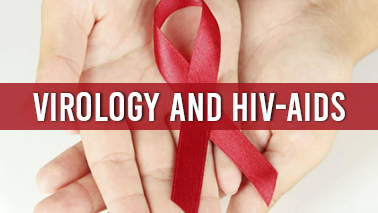
With the continuous emerging of new strains of viruses, virologists played a major role in finding new advancements to fight against them. They became the most complex organisms causing dreadful diseases. One among them is the HIV-1, a retrovirus causing AIDS making the immune system the primary target. It has been around 20 years, our scientists researching on this HIV and though antiretroviral drugs reduced the mortality rate, still lot more research to be done to eradicate this completely. Join us and share your thoughts alos on this hot topic
In 2019, the global antiviral drugs market size was valued at $56.4 billion and is expected to register a CAGR of 2.3% over the estimated period. Around 1,848 pipeline products are specifically in development for treating the viral infections. Global HIV Drug Market was valued at USD20,448 million in 2015 and is predicted to reach USD26,458 million by 2022, at a CAGR of 3.7% during the forecast period of 2016-2022.
Sub-Tracks
Market Analysis: projecting a steady and robust expansion. Instead of the previously cited figures, a more current analysis indicates the market, valued at $2.96 billion in 2024, is expected to reach $5.31 billion by 2030, reflecting a substantial CAGR of 10.3%. This upward trajectory is primarily fueled by a paradigm shift towards more accessible testing methods, such as point-of-care (POC) and at-home self-testing kits, which are gaining traction due to their convenience, privacy, and speed. Furthermore, the market is being propelled by increased government initiatives and global health campaigns, including those by UNAIDS, which are intensifying efforts to meet ambitious testing and treatment targets. Technological innovations, such as the integration of molecular diagnostics and multiplex platforms that can test for multiple infections simultaneously, are also key drivers, enhancing the accuracy and efficiency of diagnostic tools. This combination of rising awareness, supportive policies, and advanced technology is set to redefine the landscape of HIV diagnostics and significantly boost its market value in the coming years.
For More Details: https://microbiology-infectiousdiseases.peersalleyconferences.com/tracks/virology-and-hivaids
Tags
Vaccines conferences
Infection Conferences 2022 Asia
Healthcare Conferences
Virology Conferences
Infectious Diseases Conferences
Infectious Diseases Conferences Middle East
Communicable Diseases Conferences 2022
Infectious Diseases Conferences Europe
Immunologists Conferences 2022
Infectious Diseases Conferences
Emerging Infectious Diseases Conferences
Antimicrobial Conferences
Hepatitis Conferences
Epidemiology Conferences 2022
Infection Conferences 2022
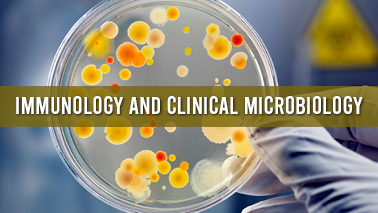
To understand the infectious diseases, we need to study deeply both the immunology and microbiology as one focuses on host and the other on pathogen affecting the host. Here we planned this particular session to discuss in detail to have better understanding of Infectious diseases including genetics, biochemistry, molecular and computational biology, molecular and cellular components of the immune system
Global immunology treatment market is set to expand, from $61.5 billion in 2015 to reach $74.2 billion in 2022. The pharmaceutical pipeline for immunology is countable, currently with 1,896 products in active development. 85 of these are in Phase III and 73% of these pipeline products are in the early developmental stages. The global immunology market size was USD 77,365.4 Million in 2018 and is estimated to reach USD 143,833.2 Million by 2026
Sub-Tracks
Market Analysis: The global immunology and clinical microbiology markets are both experiencing robust growth, driven by a confluence of technological advancements and the increasing global burden of infectious and autoimmune diseases. The immunology market is currently valued at approximately $116.4 billion in 2025 and is projected to reach $206.58 billion by 2034, with a notable compound annual growth rate (CAGR) of about 6.58%. This significant expansion is primarily fueled by the development and adoption of innovative therapies, particularly monoclonal antibodies (mAbs), which are the dominant product segment. The clinical microbiology market, on the other hand, is valued at an estimated $5.26 billion in 2025 and is projected to grow to $7.71 billion by 2032, with a CAGR of around 5.6%. The growth in this sector is largely propelled by the increasing prevalence of infectious diseases and the urgent need for rapid, accurate diagnostics to combat issues like antimicrobial resistance. The growth in both markets is driven by several key factors. The rising incidence of autoimmune conditions like rheumatoid arthritis and infectious diseases, including those caused by drug-resistant pathogens, creates a continuous demand for advanced diagnostic tools and effective treatments. Technological innovations are transforming both fields, with a shift towards rapid, automated, and high-throughput methods. For instance, in clinical microbiology, traditional culture-based techniques are being replaced by advanced molecular diagnostics such as PCR, Next-Generation Sequencing (NGS), and MALDI-TOF mass spectrometry. Similarly, in immunology, the focus on personalized medicine is leading to the development of tailored immunotherapies. However, both markets face challenges, including the high cost of advanced instruments and therapies, stringent regulatory processes, and a persistent shortage of skilled professionals, which can limit their full growth potential. Overall, these markets are poised for sustained growth, driven by an evolving landscape of scientific innovation and pressing global health needs.
For More Details : https://microbiology-infectiousdiseases.peersalleyconferences.com/tracks/immunology-and-clinical-microbiology
Tags
Antimicrobial Conferences
Parasitology Conferences
Tropical Medicine Conferences Australia
Infectious Diseases Conferences Europe
Infection Control Conferences
Vaccines conferences
Emerging Infectious Diseases Conferences
Virology Conferences
Paediatric Infectious Diseases Conferences
Infectious Diseases Conferences
Infectious Diseases Conferences
Infection Conferences
Healthcare Conferences
Immunologists Conferences 2022
Infectious Diseases Conferences 2022
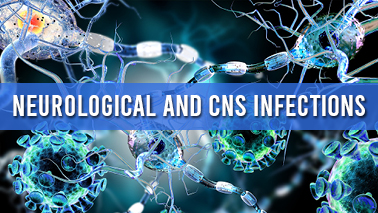
Bacteria, Virus and Fungi can even affect the Central Nervous System of our body. They may affect brain, spinal cord, neurons at any level. Initial prognosis and diagnosis is essentially required to save the life. Share your research work and help many individuals facing adverse consequences because of these infections
The global Central Nervous System therapeutic market size was worth $77.2 billion in 2016 and is expected to grow at a CAGR of 5.9% during the forecast period. The annual incidence of bacterial CNS infections has been 36.3/100,000 and that of viral infections is 688.0/100 000.
Sub-Tracks
Market Analysis: The market for neurological and central nervous system (CNS) therapeutics, a broader category that includes treatments for a wide range of conditions, is currently valued at approximately $134.42 billion in 2025. It is projected to experience substantial growth, reaching an estimated $185.90 billion by 2030, with a notable compound annual growth rate (CAGR) of 6.70%. This expansion is propelled by several key drivers. Firstly, a globally aging population is leading to a higher prevalence of neurodegenerative diseases, such as Alzheimer's and Parkinson's, which are the fastest-growing segment and are expected to drive significant demand for novel therapies. Secondly, advancements in diagnostics, including neuroimaging and biomarker-based testing, are enabling earlier and more accurate diagnosis, thereby expanding the patient population eligible for treatment. Additionally, a renewed focus on R&D by pharmaceutical companies is leading to the development of cutting-edge treatments like gene therapy, personalized medicine, and AI-driven drug discovery, which are revolutionizing the landscape. North America currently holds the largest market share, fueled by its robust healthcare infrastructure and high R&D investments, while the Asia-Pacific region is poised to be the fastest-growing market due to its large population and improving healthcare expenditure. However, the market faces certain restraints, including high clinical trial failure rates, the substantial cost of advanced therapies, and the persistent challenge of the blood-brain barrier for drug delivery, which can hinder market growth despite the immense clinical need.
For More Details: https://microbiology-infectiousdiseases.peersalleyconferences.com/tracks/neurological-and-cns-infections
Tags
Infection Conferences 2022 USA
Hepatitis Conferences
Infection Prevention & Control Conferences Asia
Infectious Diseases Conferences Europe
Clinical Microbiology Conferences
Antimicrobial Conferences
Infection Conferences
Epidemiology Conferences
Infectious Diseases Conferences 2022
Infectious Diseases Conferences
Parasitology Conferences
Epidemiology Conferences 2022
Infectious Diseases Conferences
Tropical Medicine Conferences Australia
Infection Prevention Conferences 2022

HAIs are the infections that people usually get when they are getting treated for some other disease/disorder. These are having devastating consequences and may be the significant cause of illness and death. Hospitals, surgical centers, clinics are the major places for these kind of infections. 1 among every 25 hospitalized patients acquire HAIs so there comes the need of discussions on these Healthcare associated Infections
Sub-Tracks
Market Analysis: The Healthcare-Associated Infections (HAIs) diagnostics market is poised for significant future expansion, driven by the critical need for swift and accurate pathogen detection to combat rising antimicrobial resistance. The market, which was valued at an estimated $4.3 billion in 2024, is projected to reach $4.74 billion by 2030, reflecting a CAGR of 1.5% over the forecast period. This growth is being propelled by the rapid adoption of advanced technologies, particularly molecular diagnostics, which are set to grow at the fastest rate of 1.71% CAGR due to their superior speed and precision in identifying infectious agents. The market is also benefiting from a growing emphasis on point-of-care (POC) and rapid diagnostic testing, as these solutions enable healthcare providers to make timely clinical decisions, improve patient outcomes, and streamline infection control protocols. While North America remains a dominant force with its advanced healthcare infrastructure, the Asia-Pacific region is emerging as the fastest-growing market, with an anticipated CAGR of 2.29% for diagnostics, driven by increasing healthcare investments and a growing awareness of infection prevention. This dynamic landscape highlights a shift towards more proactive and technologically-driven approaches to manage and contain the spread of HAIs.
For More Details: https://microbiology-infectiousdiseases.peersalleyconferences.com/tracks/healthcare-associated-infections
Tags
Emerging Infectious Diseases Conferences
Paediatric Infectious Diseases Conferences
Infection Prevention Conferences 2022
Infection Conferences 2022 Asia
Infectious Diseases Conferences Europe
Infectious Diseases Conferences
Pathology Conferences
Infectious Diseases Conferences
Tropical Medicine Conferences Australia
Infection Conferences
Immunologists Conferences 2022
Infection Prevention & Control Conferences Asia
Infectious Diseases Conferences
Parasitology Conferences
Hepatitis Conferences
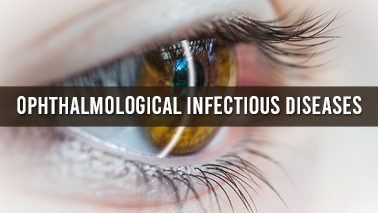
As mentioned earlier above, emerging infectious diseases became life threatening because of globalization. Now these find their way even in Ophthalmology causing infections to eye. This session describes the infections of eye in detail and how they can be diagnosed and treated with the recent advancements of the research field
Sub-Tracks
Market Analysis: The global ophthalmological infectious-disease therapeutics market (eye-infection treatment) is currently estimated at about USD 8.16 billion in 2025 and is projected to reach USD 9.83 billion by 2030 (CAGR ~3.8%), driven by steady volumes of bacterial, viral, and fungal eye infections, expanding OTC access to anti-infective drops, and incremental innovation in sustained-release delivery and combination formulas. Within this, conjunctivitis remains the largest revenue pool, at ~USD 4.53 billion in 2025 and tracking toward ~USD 5.54 billion by 2030 (CAGR ~4.1%); the viral conjunctivitis drugs niche is expected to rise from ~USD 375 million in 2025 to ~USD 531 million by 2032 (CAGR ~5.1%), reflecting periodic outbreaks and heightened hygiene awareness. By geography, mature markets continue to anchor absolute dollars while emerging Asia adds the fastest unit growth; for example, the U.S. alone is expected to take conjunctivitis treatment revenues to ~USD 1.6 billion by 2030 (CAGR ~3.8%) on stable prescribing and aging demographics. Looking at product classes, ophthalmic anti-infectives as a category are on track to reach roughly USD 6.5 billion by 2033, indicating durable demand for topical antibiotics/antivirals even amid generic erosion, while enabling technologies such as ophthalmic drug-delivery systems are forecast to expand to ~USD 23.36 billion by 2030 (CAGR ~6.6% from mid-decade), supporting longer-acting inserts and improved adherence that lift branded value capture. Altogether, these trajectories imply a mid-single-digit growth profile for infectious ophthalmology through 2030+, with upside tied to launches that shorten dosing cycles or address resistance patterns, and downside chiefly from patent cliffs and continued genericization of first-line antibiotics.
For More Details : https://microbiology-infectiousdiseases.peersalleyconferences.com/tracks/ophthalmological-infectious-diseases
Tags
Infection Conferences 2022 Asia
Infectious Diseases Conferences 2022
Epidemiology Conferences 2022
Influenza Conferences
Pathology Conferences
Infectious Diseases Conferences
Infection Prevention & Control Conferences Asia
Clinical Microbiology Conferences
Infection Control Conferences
Infection Prevention Conferences 2022
Tropical Medicine Conferences Australia
Paediatric Infectious Diseases Conferences
Immunologists Conferences 2022
Antimicrobial Conferences
Infectious Diseases Conferences
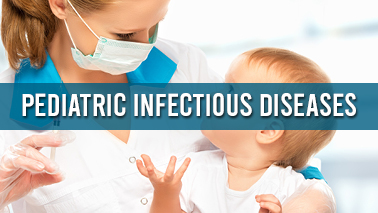
Neonatal Diseases are very common as they will be consistently subjected to the infections caused by microbes. They can be of any reason/unknown reason or acquired from mother. Special attention should be given while treating them with the medications/vaccines or course of medications as their body molecular structure will be different and sensitive from that of adults especially while treating life threatening diseases. Learn more from the physicians and specialists expertise in the pediatric care
Sub-Tracks
Tags
HIV/AIDS conferences
Pathology Conferences
Emerging Infectious Diseases Conferences
Epidemiology Conferences 2022
Infectious Diseases Conferences
Antimicrobial Conferences
Tropical Medicine Conferences Australia
Immunologists Conferences 2022
Infection Prevention & Control Conferences Asia
Infectious Diseases Conferences Europe
Infectious Diseases Conferences
Healthcare Conferences
Infection Conferences 2022 USA
Paediatric Infectious Diseases Conferences
Influenza Conferences
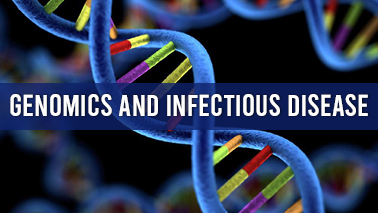
This became the most interesting field now a days with the evolving nature of microbes. To know the information of an infection and its epidemiology etc the genomic study of the microbial strains is the only way to study about the disease further. Thus it plays a major role in prognosis, drug development, diagnosis and its epidemic control etc
Tags
Clinical Microbiology Conferences
Infectious Diseases Conferences Europe
Infection Control Conferences
Communicable Diseases Conferences 2022
Infectious Diseases Conferences 2022
Hepatitis Conferences
Epidemiology Conferences
Healthcare Conferences
Emerging Infectious Diseases Conferences
Immunologists Conferences 2022
Vaccines conferences
Infectious Diseases Conferences Middle East
Infectious Diseases Conferences 2022
Paediatric Infectious Diseases Conferences
Infection Conferences 2022

Coronaviruses cause illness to humans ranging from the common cold to dreadful diseases. COVID-19 is a new strain discovered in the year 2019 which has not identified previously in humans. They are transmitted from animals to humans. Common signs include respiratory discomfort, fever and cough, shortness of breath and breathing difficulties. To prevent the spreading of the infection regular hand washing, covering mouth and nose while coughing and sneezing, thoroughly cooking meat and eggs is highly recommended. It is better to avoid close contact with the one showing symptoms of respiratory illness such as coughing and sneezing.
This session was designed to discuss the recent research going on which will aid in giving new ideas and new ways to combat this dreadful disease spreading all across the globe.
Tags
HIV/AIDS conferences
Antimicrobial Conferences
Pathology Conferences
Infectious Diseases Conferences 2022
Paediatric Infectious Diseases Conferences
Infectious Diseases Conferences
Hepatitis Conferences
Communicable Diseases Conferences 2022
Infection Prevention Conferences 2022
Epidemiology Conferences
Virology Conferences
Infection Conferences 2022 USA
Infectious Diseases Conferences 2022
Infection Conferences 2022
Infectious Diseases Conferences Europe
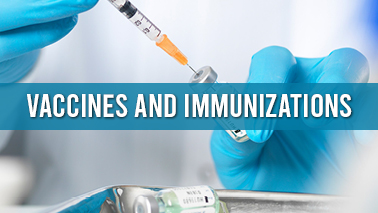
Unlike other drugs used to treat the diseases, vaccines completely prevent the disease and thus became the effective way of treatment for many dangerous life threatening diseases. Immunization or Vaccination is generally done in childhood age to protect against the infection. Various forms of vaccinations were discovered. There by discussions will be on different types of vaccines for infections, their research and development stages etc..
Global vaccines market is estimated to reach $58.4 billion by 2024 from $41.7 billion in 2019, at a CAGR of 7.0% during the forecast period. This is driven by the rise in prevalence of infectious diseases and vaccines are considered the best way to prevent these infectious diseases.
Sub-Tracks
Market Analysis: The vaccines and immunizations market is entering 2025 on a strong growth trajectory, with revenues estimated at nearly USD 84 billion and projected to reach close to USD 115 billion by 2030, representing a sustained CAGR of about 6–7%. This expansion is being fueled by steady global demand for influenza, HPV, and pediatric vaccines, alongside heightened adoption of adult immunization programs and booster campaigns for respiratory illnesses. A particularly dynamic segment is mRNA-based vaccines, which account for more than USD 10 billion in 2025 and are forecast to nearly double to USD 18 billion by 2030 at an impressive ~12% CAGR, underlining the growing role of novel platforms in shaping the future of preventive care. Forward-looking analyses suggest that if next-generation delivery systems and therapeutic vaccines achieve wider clinical adoption, the overall market could surpass USD 150 billion by the mid-2030s. Numerically, this positions vaccines and immunizations as one of the most resilient sectors in healthcare, balancing predictable baseline demand with high-growth opportunities in innovation-driven subsegments.
For More Details : https://microbiology-infectiousdiseases.peersalleyconferences.com/tracks/vaccines-and-immunizations
Tags
Infectious Diseases Conferences
Infection Prevention & Control Conferences Asia
Epidemiology Conferences
Infectious Diseases Conferences 2022
Infectious Diseases Conferences Europe
Antimicrobial Conferences
Virology Conferences
Infectious Diseases Conferences Middle East
Infectious Diseases Conferences
Infection Prevention Conferences 2022
Pathology Conferences
Infection Conferences 2022 Asia
Vaccines conferences
Infection Control Conferences
HIV/AIDS conferences
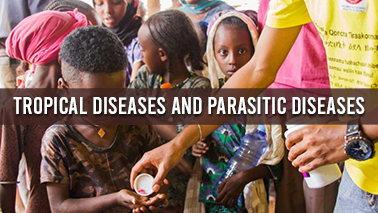
Some bacterial and viral infections are restricted to specific tropical/sub-tropical regions causing Tropical diseases. This may be due to environmental/biological factors. Neglected tropical diseases (NTDs) are also the cases reported in these regions of low and middle income countries who don’t have proper sanitation in their living areas. Effective control need to be achieved by educating everyone with proper health approaches.
Parasites are the small organisms causing various types of infections in the host body. Even though all these are interlinked there is need to specifically address these parasitic diseases as many contagious diseases were reported from these.
The global neglected tropical disease treatment market size was accounted for $1.2 billion in 2018 and is estimated to grow at a CAGR of 5.5% over the forecast period. The global parasitic diseases therapeutics market size might grow by $1.79 billion during 2019 to 2023.
Sub-Tracks
Tags
Epidemiology Conferences 2022
Paediatric Infectious Diseases Conferences
Tropical Medicine Conferences Australia
Immunologists Conferences 2022
Communicable Diseases Conferences 2022
Virology Conferences
Infectious Diseases Conferences 2022
HIV/AIDS conferences
Antimicrobial Conferences
Infectious Diseases Conferences 2022
Infectious Diseases Conferences
Epidemiology Conferences
Infection Prevention Conferences 2022
Emerging Infectious Diseases Conferences
Infection Conferences 2022 Asia

STDs and STIs are having a profound impact on sexual and reproductive health globally. Every year, there are an estimated 376 million new infections. Gonorrhoea, Chlamydia, Syphilis and Trichomoniasis are most commonly seen. HSV and HPV are the viruses causing these infections. These are causing the major death in women and newborns which need to be focused on.
In 2017, global STD testing market was valued for $ 86,548.0 million. It is predicted to reach USD 133,935.7 million by 2025, at a CAGR of 5.6% from 2018- 2025. The diagnosis of these STDs caused by Syphilis is rising and is expected to account for over 20% of the market by 2022, growing at a CAGR over the forecast period due to high prevalence of syphilis infections globally.
Sub-Tracks
Tags
Pathology Conferences
Infectious Diseases Conferences 2022
Infection Conferences
Infection Conferences 2022 Asia
Epidemiology Conferences 2022
Virology Conferences
Infectious Diseases Conferences
Antimicrobial Conferences
Infection Control Conferences
HIV/AIDS conferences
Infectious Diseases Conferences
Clinical Microbiology Conferences
Hepatitis Conferences
Epidemiology Conferences
Emerging Infectious Diseases Conferences

Knowing about these Infectious Diseases is much more important to proceed for the treatment. Here comes the necessity of studying pathophysiology of the diseases and also the correct and accurate method for diagnosing it. Many advancements took place in the field of diagnostic studies. Let’s discuss about all the research advancements and pathophysiological studies
Sub-Tracks
Tags
Infection Prevention Conferences 2022
Tropical Medicine Conferences Australia
Emerging Infectious Diseases Conferences
Vaccines conferences
Healthcare Conferences
Infection Conferences 2022 Asia
Clinical Microbiology Conferences
Infectious Diseases Conferences Middle East
Epidemiology Conferences
Infection Conferences 2022 USA
Communicable Diseases Conferences 2022
Immunologists Conferences 2022
HIV/AIDS conferences
Infection Control Conferences
Epidemiology Conferences 2022

Clinical Trails are very important before releasing a novel medicine to the market. It might take few years to complete. Not only for treatment methods but also for diagnosing or detecting new possible ways to treat diseases. Case studies play equal importance in exploratory research. These provide the clinical evidence documentation which can be helpful for the fellow researchers to study as well
Sub-Tracks
Tags
Infectious Diseases Conferences
Infection Conferences 2022
Tropical Medicine Conferences Australia
Infection Prevention & Control Conferences Asia
Pathology Conferences
Infection Control Conferences
Infectious Diseases Conferences
Epidemiology Conferences 2022
Infectious Diseases Conferences Middle East
Virology Conferences
Influenza Conferences
HIV/AIDS conferences
Clinical Microbiology Conferences
Infection Conferences
Infection Conferences 2022 USA

Now comes the session explaining the factors that influences the onset and spreading of Infectious Diseases. These may vary from environmental to biological. A brief idea about the factors helps for the further study regarding the diseases.
Sub-Tracks
Tags
Vaccines conferences
Healthcare Conferences
Pathology Conferences
HIV/AIDS conferences
Infection Conferences 2022 Asia
Clinical Microbiology Conferences
Infectious Diseases Conferences Europe
Parasitology Conferences
Influenza Conferences
Infection Prevention & Control Conferences Asia
Epidemiology Conferences 2022
Antimicrobial Conferences
Infectious Diseases Conferences 2022
Infection Conferences 2022 USA
Paediatric Infectious Diseases Conferences

With the overview we had about the IDs, our scientists have designed many medications and vaccines to prevent the diseases which had effectively showed the results. But due to emerging forms of infections still we have been struggling to fight against the infections. This session helps to discuss regarding the strategies or methods which are being developed.
Sub-Tracks
Tags
Virology Conferences
Tropical Medicine Conferences Australia
Epidemiology Conferences
Emerging Infectious Diseases Conferences
Infection Prevention Conferences 2022
Infection Conferences
Communicable Diseases Conferences 2022
Healthcare Conferences
Antimicrobial Conferences
Infectious Diseases Conferences
Infection Prevention & Control Conferences Asia
Infectious Diseases Conferences Europe
Infection Control Conferences
Vaccines conferences
Infection Conferences 2022 Asia

IDs still became a major concern occurring frequently across the world. There is definite necessity to follow few things to prevent or control these diseases. This session includes those preventive measures to be taken and follow for well-being of every individual. This includes maintaining hygienic environment within and around ourselves taking individual responsibility and following the guidelines issued by the authorities in regards to health and safety
Sub-Tracks
Tags
Healthcare Conferences
Paediatric Infectious Diseases Conferences
Hepatitis Conferences
Emerging Infectious Diseases Conferences
Virology Conferences
Pathology Conferences
HIV/AIDS conferences
Immunologists Conferences 2022
Infectious Diseases Conferences Europe
Infectious Diseases Conferences
Communicable Diseases Conferences 2022
Antimicrobial Conferences
Vaccines conferences
Infectious Diseases Conferences 2022
Infection Conferences 2022
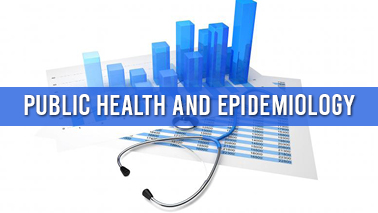
Epidemiology of an infectious disease (ID) involves the study of prevalence and incidence of infections to better understand the burden and causes among the populations. These are one of the major cause of morbidity and mortality globally. The study ranges from the search of novel pathogens, Causative organism, Host, Mode of transmission, Incubation period, usual symptoms, complications and mortality rate using advanced molecular techniques to population based studies to explain the transmission dynamics & spectrum of disease.
Sub-Tracks
Tags
Infectious Diseases Conferences Middle East
Paediatric Infectious Diseases Conferences
Influenza Conferences
Infectious Diseases Conferences Europe
Infection Control Conferences
Epidemiology Conferences 2022
Communicable Diseases Conferences 2022
Epidemiology Conferences
Parasitology Conferences
Antimicrobial Conferences
Infection Prevention & Control Conferences Asia
Infectious Diseases Conferences 2022
Tropical Medicine Conferences Australia
Infectious Diseases Conferences 2022
Emerging Infectious Diseases Conferences

Odontogenic infections are mostly and frequently seen among the individuals. Due to the advancements in the medical field, techniques, antibiotic usage and genetics there is a need to discuss the advancements in this specific field
Tags
Infectious Diseases Conferences Middle East
Tropical Medicine Conferences Australia
Paediatric Infectious Diseases Conferences
Clinical Microbiology Conferences
Infection Control Conferences
Infectious Diseases Conferences 2022
Epidemiology Conferences
Influenza Conferences
Infectious Diseases Conferences
Epidemiology Conferences 2022
Infectious Diseases Conferences Europe
Infectious Diseases Conferences
Immunologists Conferences 2022
Antimicrobial Conferences
Infection Conferences 2022
Infectious Diseases and Antimicrobial Resistance Market Overview
The infectious diseases and antimicrobial resistance (AMR) market is growing as drug-resistant infections rise worldwide. The antibiotic resistance segment is valued at USD 9.3 billion in 2025 and projected to reach USD 12.1 billion by 2030 (CAGR 5.5%). Growth is fueled by increasing cases, public–private funding, and regulatory support. Asia-Pacific leads the market, South America shows the fastest growth, and pneumonia remains the largest disease segment.
The AMR diagnostics market, worth USD 4.6 billion in 2024, is expected to hit USD 6.7 billion by 2030 (CAGR 6.6%). Demand is rising for rapid, point-of-care tests, especially PCR-based technologies. North America currently dominates, but India and other emerging economies are expanding quickly, driven by the need for early detection and better antibiotic stewardship.
The AMR surveillance market is valued at USD 6.24 billion in 2025 and forecasted to reach USD 8.23 billion by 2030 (CAGR 5.7%). Growth is driven by molecular diagnostics, AI-powered analytics, and government programs. North America holds the largest share, while Asia-Pacific is the fastest-growing region. Hospitals remain the main users, with diagnostic labs gaining momentum.
Despite this momentum, the sector faces challenges: the low profitability of antibiotics, high development costs, and weak investment, especially in low- and middle-income countries. Still, opportunities lie in next-generation therapies such as bacteriophages, CRISPR-based drugs, and microbiome solutions, alongside AI-driven surveillance and portable diagnostics. With sustainable financing and global cooperation, these innovations could transform the AMR landscape and strengthen the fight against infectious diseases.
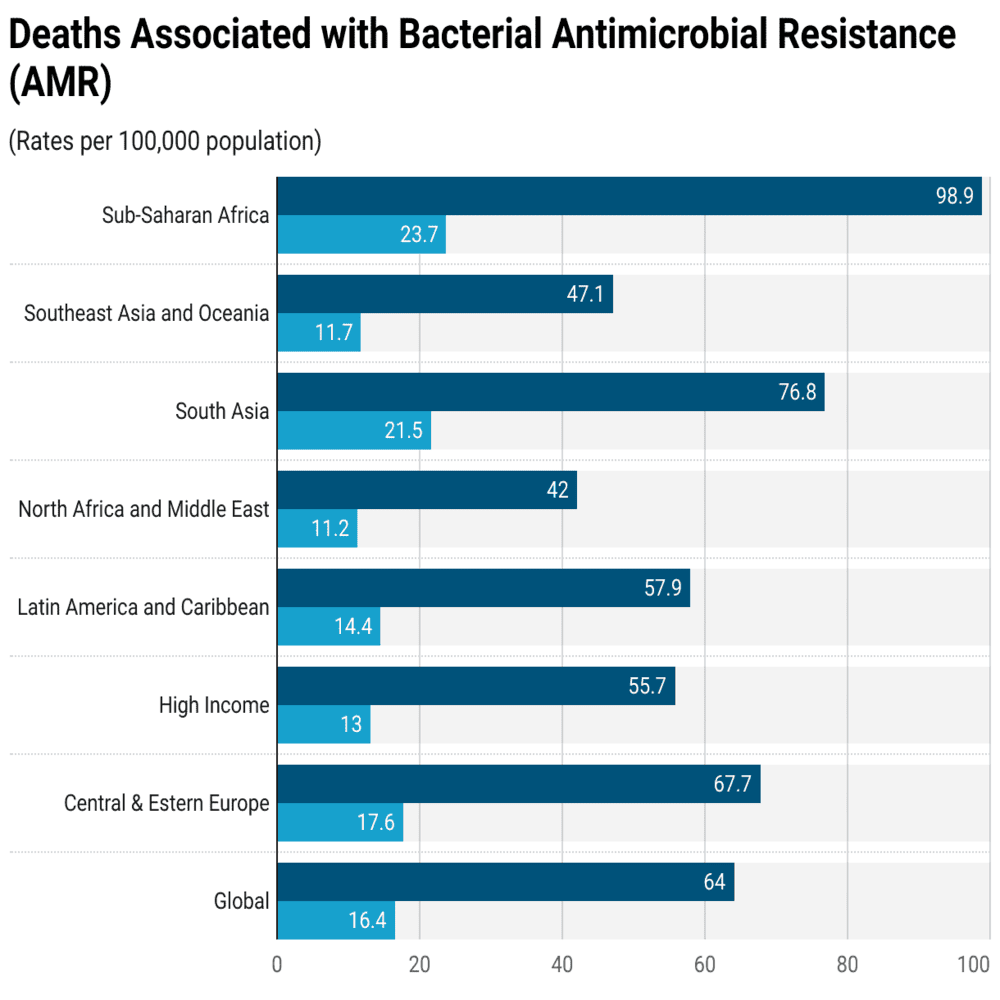
Infectious Diseases and Antimicrobial Resistance Market Overview in USA:
The U.S. infectious diseases market is one of the most advanced globally, valued at over USD 24 billion in 2025, with a projected CAGR of 6–7% through 2030. Growth is driven by increasing hospital-acquired infections (affecting nearly 1 in 31 patients daily, CDC) and viral threats such as influenza, RSV, and COVID-19 variants. The U.S. accounts for a significant share of global vaccine revenues, with the influenza vaccine market alone expected to exceed USD 6.5 billion by 2028. Advanced diagnostic platforms, particularly rapid molecular tests, are also expanding at a CAGR of nearly 9%, reflecting the demand for early detection and containment of outbreaks.
Antimicrobial resistance (AMR) remains a major challenge, causing 2.8 million infections and 35,000 deaths annually in the U.S. (CDC, 2023). The U.S. AMR therapeutics market is valued at USD 3.5–4 billion in 2025, and expected to grow at a CAGR of 5% due to rising resistance in pathogens such as E. coli, Klebsiella pneumoniae, and Pseudomonas aeruginosa. Federal funding has increased, with initiatives like CARB-X awarding over USD 360 million to early-stage AMR projects and BARDA investing more than USD 1 billion in advanced-stage antibiotic and diagnostic development. Rapid diagnostic tests for AMR are also gaining traction, with adoption projected to grow 2x by 2030.
Looking ahead, the U.S. infectious diseases and AMR market is poised for steady expansion, projected to reach USD 33–35 billion by 2030. Government incentives such as the FDA’s QIDP designation, which provides market exclusivity and priority review for new antibiotics, are encouraging innovation. However, the market faces hurdles: the average cost of antibiotic R&D exceeds USD 1.5 billion, while uptake remains slow due to stewardship programs and reimbursement challenges. Despite these barriers, strong federal support and industry investment position the U.S. as a global leader in infectious disease management, with increasing focus on next-generation antibiotics, vaccines, and precision diagnostics to combat AMR.
Infectious Diseases and Antimicrobial Resistance Market Overview in Europe:
The commercial landscape in Europe is being reshaped by hard epidemiology and rising stewardship pressure. AMR is linked to 35,000+ deaths every year in the EU/EEA and an estimated 865,000+ resistant infections annually; the economic drag is ~€11.7 billion per year (PPP) across EU/EEA economies, a recurrent burden that continues to justify spend on novel antibiotics, rapid diagnostics, and infection-prevention solutions. On the demand side, antibiotic consumption fell sharply by 17% from 2018 to 2021, then rebounded to 19.8 DDD/1,000/day in 2023 (vs. 20.1 in 2018)—signalling renewed utilization post-pandemic and exposing variation across member states that vendors must factor into go-to-market plans. In 2023, about 90% of use sat in the community (18.3 DDD/1,000/day) versus 1.6 in hospitals, keeping primary care channels central for stewardship tech and point-of-care diagnostics.
Policy and funding are strong tailwinds. The 2023 EU Council Recommendation sets One-Health targets on IPC, stewardship and national action plan execution, while the Commission and ECDC ramp guidance and monitoring—creating compliance-driven demand for surveillance and IPC solutions. The EU’s health security arm HERA commands ~€2.8 billion (EU4Health) and ~€1.7 billion (Horizon Europe) for 2022–2027, and recent calls include a €13 million instrument for rapid point-of-care susceptibility testing—clear signals for diagnostics innovators. For 2025 specifically, the EU4Health work programme allocates €357.6 million to HERA actions, with procurement and grants as key vehicles—relevant for scale-up pathways and public tenders.
Market access is also moving: Europe has approved new agents (e.g., Emblaveo and Exblifep) for difficult Gram-negative infections, expanding the treatable addressable market while emphasizing antimicrobial stewardship frameworks at launch. Meanwhile, lawmakers debate transferable exclusivity vouchers (TEVs) as a pull incentive—industry sees them as catalytic, while public-health groups raise affordability and spillover concerns. Whichever design prevails, a predictable EU pull-incentive is the swing factor for late-stage pipeline investment and partnering decisions through 2030.
Infectious Diseases and Antimicrobial Resistance in Asia:
The infectious diseases and antimicrobial resistance (AMR) market in Asia is expanding rapidly, driven by rising infection rates, high antibiotic misuse, and increasing healthcare investments. The Asia-Pacific antibiotic resistance market was valued at USD 2.34 billion in 2023 and is projected to reach USD 3.57 billion by 2030, reflecting a CAGR of about 6.2%. In parallel, the AMR diagnostics segment is expected to grow from USD 1.05 billion in 2024 to USD 1.64 billion in 2030, at a 7.8% CAGR, while the antimicrobial susceptibility testing (AST) market is forecast to expand from USD 627.6 million in 2023 to USD 967.5 million by 2030 (CAGR 6.4%). These figures show that Asia is becoming a key growth hub for both therapeutic and diagnostic solutions in AMR, reflecting both the severity of the regional burden and growing demand for stewardship technologies.
The health burden of AMR in Asia is particularly severe. Globally, 5 million deaths in 2019 were linked to AMR, of which 1.27 million were directly attributable. South Asia recorded some of the world’s highest mortality, with 21.5 deaths per 100,000 population due to AMR, while Southeast and East Asia saw 11.7 per 100,000. In the WHO South-East Asia Region alone, sepsis accounted for 4 million deaths in 2019, and up to 1.41 million of these were linked to bacterial AMR. For India, the estimated toll was 297,000 deaths from resistance in a single year. Resistance trends are worsening: between 2016 and 2021, E. coli susceptibility to imipenem fell from 86% to 64%, while Klebsiella pneumoniae dropped from 65% to 43%. In 2021, carbapenem resistance in Acinetobacter baumannii reached 87.5%, and methicillin-resistant Staphylococcus aureus (MRSA) rose from 28.4% to 42.6% over the same period.
Behavioral and systemic factors continue to accelerate resistance across Asia. Self-medication rates for antibiotics range from 9% to 62% across the region, often linked to misconceptions about their effectiveness against viral infections like colds and flu. In Indonesia, around 75% of respondents believed antibiotics could treat viral illnesses, while in China, more than half of people reported antibiotic use within six months, with about 5% sourcing drugs online. Meanwhile, the agricultural sector is a major contributor: antibiotic use in animal husbandry across China and India is projected to double by 2030, creating spillover risks into human populations. The pace of urbanization is another driver, with Asia expected to host 27 of the world’s 43 megacities by 2030, where high population density and poor sanitation amplify transmission of resistant pathogens. Together, these drivers underscore both the urgency of policy and market interventions and the strong opportunity for solutions spanning novel antibiotics, rapid diagnostics, infection-control systems, and stewardship programs.
Infectious Diseases and Antimicrobial Resistance in Middle East:
The Middle East is emerging as a pivotal region in the global infectious diseases and antimicrobial resistance (AMR) landscape, shaped by rapid population growth, expanding healthcare infrastructure, and heightened vulnerability to outbreaks. The antibiotic resistance treatment market across the Middle East and Africa was valued at approximately USD 215 million in 2023 and is projected to grow to USD 316.9 million by 2030, advancing at a 5.7% CAGR. Alongside this, the AMR diagnostics market generated USD 213.5 million in 2024 and is expected to rise to USD 314.3 million by 2030, supported by a 6.7% CAGR. Countries such as Saudi Arabia and the UAE are outperforming the regional average, with diagnostics growth rates of 6.9% and 7.1% respectively, reflecting strategic government investment in laboratory networks, genomic surveillance, and digital health platforms.
In therapeutics, the market is showing steady but moderate expansion. The infectious disease therapeutics sector stood at USD 8.2 billion in 2024 and is projected to reach USD 9.61 billion by 2030, at a 3.7% CAGR. While large in value, this segment is less dynamic than diagnostics, underscoring limited antimicrobial innovation and a growing emphasis on early detection and stewardship over reliance on new drug launches. On the other hand, the infectious disease diagnostics market overall is growing at nearly triple the pace, forecasted to increase from USD 1.76 billion in 2024 to USD 3.96 billion by 2033, achieving a 9.4% CAGR. This surge is being fueled by persistent post-COVID testing culture, expanded molecular testing capacity, and new funding for health security programs across Gulf and North African nations.
Universities and Research Institutes:
USA
Colorado State University / University of Tennessee / Southern New Hampshire University / Northern Arizona University / University of Texas / University of Colorado Denver / Adelphi University / Indiana State University / University of Arizona / Texas State University / New York Institute of Technology / National University / Montana State University / University At Buffalo, The State University of New York / Texas Tech University / Virginia Commonwealth University / Oklahoma State University – Stillwater / State University of New York College At Cortland / Syracuse University / University of Pittsburgh / Central New Mexico Community College / University of Southern California / St. John's University / University of Cincinnati / College of Southern Nevada / California State University / University of Wisconsin La Crosse / Portland State University / Fairleigh Dickinson University, Metropolitan Campus / State University of New York College at Old Westbury / Seattle Central Community College / Saint Michael's College / Contra Costa College / Arizona State University / Purdue University / New York University / University of Alabama At Birmingham / University of Washington / Carnegie Mellon University / University of Florida / University of Michigan - Ann Arbor / University of California, Berkeley / Cornell University / University of Pennsylvania / Georgia Institute of Technology / University of Minnesota, Twin Cities Campus / Illinois Institute of Technology / Northwestern University / Brown University / Riverside City College / University of Iowa / University of Miami / University of South Carolina / University of North Alabama
Europe
University of Liverpool / University of Sheffield / University of Glasgow / University of Reading / Coventry University / University of Leeds / Cardiff University / University of South Wales / Nottingham Trent University / Birmingham City University / University of Bristol / University of Dundee / De Montfort University / University of Southampton / Anglia Ruskin University / Sheffield Hallam University / Cardiff Metropolitan University / Brunel University London / University of Huddersfield / Bangor University / University of Portsmouth / Northumbria University, Newcastle / University of Kent / Swansea University / Liverpool John Moores University / Robert Gordon University / University of Aberdeen / Queen's University Belfast / University of Plymouth / University of Gloucestershire / University of Salford / Ulster University / Oxford Brookes University / Heriot-Watt University / University of Buckingham / Durham University / Aberystwyth University / Keele University / University of Lincoln / University of Brighton / University of Strathclyde / University of York / Lancaster University / University of the West of England / University of Bradford / Royal Holloway, University of London / Queen Mary University of London / University of Westminster, London / Manchester Metropolitan University / University of Derby / Teesside University, Middlesbrough / City, University of London / York St John University / Glasgow Caledonian University / London Metropolitan University / RWTH Aachen University / Technical University of Munich / Ludwig Maximilian University of Munich / University of Bonn / University of Heidelberg
Asia/Middle East
University of Malaya / Sunway University / Monash University Malaysia / Cyberjaya University College of Medical Sciences / Universiti Tunku Abdul Rahman (UTAR) / La Trobe University / The University of Adelaide (UoA) / University of Wollongong / Curtin University / Flinders University / Victoria University / Swinburne University of Technology / University of Newcastle / Tunku Abdul Rahman University College / Raffles University / Sunway College Johor Bahru / ASIA Metropolitan University / KDU Penang University College / RCSI & UCD Malaysia Campus / Nilai University / Universiti Kuala Lumpur (UniKL) / Universiti Putra Malaysia (UPM) / Universiti Teknologi Malaysia (UTM) / Universiti Sains Malaysia (USM) / UCSI University / International Medical University (IMU) / Taylor's University / The University of Nottingham Malaysia Campus / The Hong Kong Polytechnic University / The University of Hong Kong / Hong Kong University of Science and Technology / City University of Hong Kong / Hong Kong Baptist University / The Education University of Hong Kong (EdUHK) / Lingnan University / Upper Iowa University / Hong Kong Shue Yan University / Hong Kong Adventist College / PSB Academy / National University of Singapore (NUS) / Nanyang Technological University (NTU) / James Cook University Singapore / Singapore Institute of Technology (SIT) / Kaplan Higher Education Academy / STEi Institute / Duke-NUS Medical School / NIE Singapore (NTU) / Parkway College of Nursing and Allied Health / HMI Institute of Health Sciences
Hospitals and Medical Centers
USA
Upper River Valley Hospital / Hackensack University Medical Center / Legacy Salmon Creek Medical Center / Houston Methodist Hospital / Hartford Hospital / University of Pittsburgh Medical Center / University of Texas MD Anderson Cancer Center / UCLA Health: Ronald Reagan UCLA Medical Center / Mercy San Juan Medical Center / Massachusetts General Hospital / Stanford Hospital & Clinics / Cleveland Clinic / Mayo Clinic Cancer Center / Palomar Medical Center / Johns Hopkins Hospital / El Camino Hospital / Abbott Northwestern Hospital / Banner – University Medical Center Phoenix / Ann & Robert H. Lurie Children's Hospital of Chicago / Aurora St. Luke's Medical Center / Baylor St. Luke's Medical Center / Beaumont Hospital / Boston Children's Hospital / Brigham and Women's Hospital / Carolinas Medical Center / Cedars-Sinai Medical Center / Children's Hospital Los Angeles / The Christ Hospital / Dartmouth-Hitchcock Medical Center / Duke University Hospital / Emory University Hospital / Florida Hospital Orlando / Geisinger Medical Center / Inova Fairfax Hospital / Intermountain Medical Center / Lehigh Valley Hospital–Cedar Crest / Loyola University Medical Center / National Institutes of Health Clinical Center / Nebraska Medicine – Nebraska Medical Center / Rush University Medical Center / Thomas Jefferson University Hospitals
Europe
Nuffield Health Bristol Hospital / Vale Hospital / Guy's and St. Thomas' / Asklepios Klinik Barmbek / Clinical Centre of Serbia / Charite – Universitatsmedizin Berlin / Helsinki University Central Hospital / Motol University Hospital / Sahlgrenska University Hospital / Vienna General Hospital / Semmelweis University Hospital / University Hospitals of Geneva / University Hospital Pilsen / LKH Klagenfurt / University Medical Center Freiburg / Armavir Medical Center / ArBeS Healthcare Center for Rehabilitation / Armenicum Clinical Center / Tsaghkahovit Medical Center / Vedi Medical Center / Tsaghkahovit Medical Center / Sf. Gheorghe Hospital / Pitești Pediatric Hospital / Pitești County Emergency Hospital / Bistrița Năsăud County Emergency Hospital / Arad County Emergency Clinical Hospital / Topolšica Hospital / Golnik University Clinic of Respiratory and Allergic Diseases / Novo Mesto General Hospital / Jesenice General Hospital / Ljubljana University Medical Centre / Bispebjerg Hospital / Rigshospitalet / Ringsted Sygehus / Frederiksberg Hospital / Fåborg Hospital / Nyborg Hospital / Svendborg Hospital / Regionshospitalet Holstebro / Aalborg Sygehus / Parkens Privathospital / Hospital of Jerez de la Frontera / Hospital Santa María del Puerto / Hospital Universitario Princesa de España / Hospital Virgen De La Victoria / Hospital Clínico Universitario Lozano Blesa / Hopital Central Universitario de Asturias / Hospital Universitario de Gran Canaria Doctor Negrín / Hospital Virgen de la Salud
Asia/Middle East
Wooridul Spine Hospital / Ramkhamhaeng Hospital / Wattanosoth Cancer Hospital / Gleneagles Medical Center / Clemenceau Medical Center / Bumrungrad International Hospital / Anadolu Medical Center / Fortis Memorial Research Institute / Prince Court Medical Centre - Kuala Lumpur / Bangkok Hospital Medical Center / Buddhist Tzu Chi Medical Foundation / Al Khor Hospital / The Cuban Hospital / Qatar Rehabilitation Institute / Hamad General Hospital / Communicable Disease Center / Saint Jude Medical Clinic / Tanchuling General Hospital / Casimiro General Hospital / Flora District Hospital / Notre Dame de Chartres Hospital / Isaac and Catalina Medical Center / Sto. Ara Medical Hospital / Cayetano Medical Clinic / Divine Care Hospital / Holy Family Medical Clinic / Lemery Doctors' Medical Center / N. L. Villa Memorial Medical Center / St. Joseph Healthcare Inc. / United Doctors of St. Camillus de Lellis Hospital / Dr. Ahmad El Masri Hospital / American University of Beirut Medical Center / Bikhazi Medical Group / Mount-Lebanon Hospital, Gharios Medical Center / Hôpital Libano Français / Cedars Jebel Ali International Hospital / Chittagong Maa-O-Shishu Hospital / Dhaka Medical College & Hospital / Eastern Hospital & Medical Research Centre / Rashid Hospital
Companies and Industries
USA
Stryker / Regeneron Pharmaceuticals / Quest Diagnostics / Pfizer / Nashville, Tenn.-based HCA Healthcare / Merck / Magellan Health / Louisville, Ky.-based Kindred Healthcare / Long Beach, Calif.-based Molina Healthcare / Laboratory Corp / King of Prussia, Penn.-based Universal Health Services / Johnson & Johnson / IQVIA / Gilead Sciences / Franklin, Tenn.-based Community Health Systems / Envision Healthcare / Eli Lilly / DaVita / Danaher / Dallas-based Tenet Healthcare / CVS Health / Cigna / Zimmer Biomet / WellCare Health Plans / UnitedHealth Group / Centene / Celgene / Bristol-Myers Squibb / Brentwood, Tenn.-based LifePoint Health / Boston Scientific / Biogen / Becton Dickson / Baxter International / AbbVie / Abbott Laboratories / Siemens Healthineers / Chembio Diagnostics Inc / Alere / Quest Diagnostics, Inc / Cardinal Health / Thermo Fisher Scientific Inc / Vertex Pharmaceuticals / Mylan Pharmaceuticals / Perrigo Pharmaceuticals / Acella Pharmaceuticals / Athens Research and Technology / Facet Medical Technologies / WuXi Apptec / Sebela Pharmaceuticals / Osmotica Pharmaceutical / Antios Therapeutics / Biothera Pharmaceuticals / MD Biosciences / MGC Diagnostics / ProMed Prototypes / Vida Diagnostics
Europe
Siemens Healthineers / Hoffmann-La Roche Ltd / Trinity Biotech / BioMérieux SA / OJ-Bio Ltd. / Amicomed Inc. / HealthBeacon / Healthera Ltd / Liva Healthcare / Oviva AG / Oxitone Medical / Pacifica Labs Inc. / Px HealthCare / Qured / Novigenix / Genomcore - Made of Genes / Lunaphore Technologies / Gondola Medical Technologies / InfiniteVision Optics / Newsenselab / Accord / Novo Nordisk / Boehringer Ingelheim / AstraZeneca / Teva Pharmaceutical Industries / GlaxoSmithKline / Sanofi / Novartis / Roche / Bayer / ThioMatrix / ABF Pharmaceutical Services / Aperion Biologics / Ares Genetics / BlueSky Vaccines / Haplogen / Hookipa Pharma / s-TARget Therapeutics / Themis Bioscience / Pfizer / Epitopoietic Research Corporation (ERC) / Integra LifeSciences / FLUIDDA / Mithra Pharmaceuticals / A-Mansia Biotech / Taconic Biosciences / BioPorto Diagnostics / Expres2ion Biotechnologies / Veloxis Pharmaceuticals / Bavarian Nordic / Zyla Life Sciences / Medix Biochemica / TILT Biotherapeutics / Charles River Laboratories / Finvector Vision Therapies / Carlina Technologies
Asia/Middle East
Trivitron Healthcare / Bio-Rad Labs Inc. / Mabworks Biotech / Charles River Laboratories / Crown Bioscience / CStone Pharmaceuticals / Hologic / Origene / Sino Biological / Shenogen Pharma / Paragon Medical / Clover Biopharmaceuticals / HitGen / Yao Pharma / Magpie Pharmaceuticals / BioMarin Pharmaceutical / Charles River Laboratories / Navitas Life Sciences / Richcore Lifesciences / Zumutor Biologics / Vyome Therapeutics / Sphaera Pharma / Bharat Biotech / Global Pharma Tek / Hinge Clinica / Sun Pharmaceuticals / Kringle Pharma / Ora Clinical / Noile-Immune Biotech / Teleflex Medical / LegoChemBio / Bridge Biotherapeutics / Samsung Bioepis / HanAll Biopharma / Eutilex / Daewoong Pharmaceutical / STC-Stem Cell Treatment & Research Institute (STRI) / GC Pharma / Novotech / Neopeutics / Invitrogen / Chugai Pharmabody Research / GlaxoSmithKline / Singapore Advanced Biologics / Sphaera Pharma / Genome & Company / Immunwork / Worldwide Clinical trials
Societies and Associations
USA
Infectious Diseases Society / Infectious Disease Association of California / Society for Healthcare Epidemiology of America / National Foundation for Infectious Diseases / Association of Medical Microbiology and Infectious Disease Canada (AMMI) / Canadian Nurses Association (CNA) / Infectious Diseases Society of America (IDSA) / Provincial Infectious Diseases Advisory Committee (PIDAC) / Society for Healthcare Epidemiology of America / International Society for Infectious Diseases (ISID) / Immunize Canada / Ontario Hospital Association (OHA) / American Academy of Allergy Asthma & Immunology / American Board of Allergy & Immunology / National Institute of Allergy and Infectious Diseases / College of American Pathologists / Centers for Disease Control / American Academy of Ambulatory Care Nursing (AAACN) / Case Management Society of America (CMSA) / Association for Professionals in Infection Control and Epidemiology (APIC) / National Association for Healthcare Quality (NAHQ) / Society For Health Care Strategy & Market Development (SHSMD) / American Society for Microbiology
Europe
European Society for Paediatric Infectious Diseases: ESPID / European Society of Clinical Microbiology and Infectious Diseases / European Respiratory Society / Healthcare Infection Society / European Lung Foundation – ELF / European Association of Urology / The European Academy of Allergy and Clinical Immunology / ESICM – European society of intensive medicine / British Society for Antimicrobial Chemotherapy / Society for Hematopathology / European AIDS Clinical Society / European Centre for Disease Prevention and Control / International Society for Infectious Diseases / British Society for Antimicrobial Chemotherapy (BSAC) / Microbiology Society / British Association for Sexual Health and HIV (BASHH) / The Hospital Infection Society (HIS) / Infection Prevention Society (IPS) / British Society for Medical Mycology (BSMM) / The Royal Society of Tropical Medicine and Hygiene (RSTMH) / UK Clinical Virology Network / Royal Society for Public Health (RSPH) / Health Protection Scotland
Asia/Middle East
Asia Pacific Society of Infection Control – APSIC / Asian Society for Pediatric Infectious Diseases: ASPID / The Urological Association of Asia / Infection Control Association / ASID - Australasian Society for Infectious Diseases / Japan Society for Surgical Infection / Asia-Pacific Society of Clinical Microbiology and Infection (APSCMI) / Association for Professionals in Infection Control and Epidemiology / Israeli Society for Infectious Diseases / The South East Asia Infectious Disease Clinical Research Network (SEAICRN) / The Asia Fungal Working Group (AFWG) / The Asian Association of UTI & STI (AAUS) / Infectious Disease Association of Thailand / The Hong Kong Infection Control Nurses’ Association / Emirates Society of Emergency Medicine (ESEM) / Infection Control Association (Singapore) / Society of Infectious Disease (Singapore) / The Lebanese Society of Infectious Diseases and Clinical Microbiology
Contact us now and we will make your event unique & unforgettable
All numbers indicates percentage %
Europe
North America
Middle East
Asia Pacific
Africa
All numbers indicates percentage %
Physicians and Internists
Microbiologists
Pharmaceutical Researchers
Healthcare Professionals
Academicians & Students
Nurse Practitioners
Epidemiologists
Association Members










